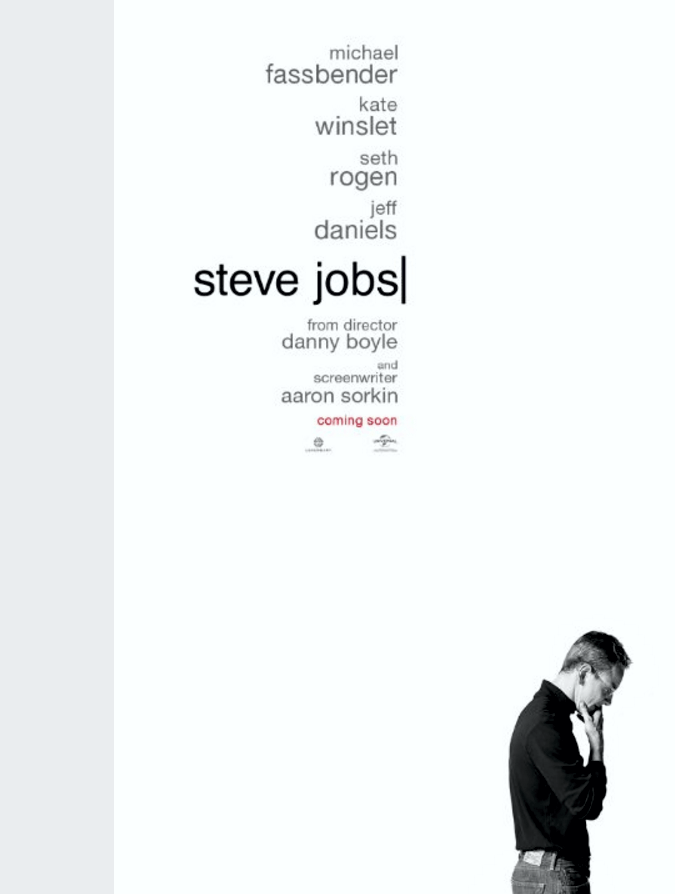Thursday, February 18, 2016 3:43 PM
I watched two movies – “Trumbo” and “Steve Jobs” –both bio-pics, obviously, but truth is stranger than fiction and Hollywood has done as much with non-fiction drama as it has with plain old movies—and I use the phrase ‘plain old movies’ advisedly, since the most impressive movies of recent days have either been historical (“Selma”, “Straight Outta Compton”) or biographical (“The Imitation Game”, “Unbroken”) or both (“Jersey Boys”, “Race”) and, since the first blush of CGI’s thrill has long since worn off, block-bluster fictional movies like “Spectre” or “The Force Awakens” (or any Marvel or DC movie) just seem that much more formulaic. Movie-making embraced childhood with its abject surrender to science fiction, sword and sorcery fantasy, and especially comic books—all the things that leant themselves to the new SFX tech’s possibilities. Now that such whiz-bang-ery is a given, these themes are poised to return to the children’s entertainment from which they came.
Don’t get me wrong—good science fiction (and yes, I’ll admit it, for Tolkien’s sake—fantasy) can still be great entertainment, suitable for grown-ups—but science fiction encompasses both sweeping visions and ‘space opera’ (i.e., soap operas with spaceships in them, like the Star Wars franchise) and for every Kubrick’s “2001: A Space Odyssey” there are a thousand “Transformers”. So I’m glad that science fiction has been taken out of the kiddy-corner—now all we need is a little judicious bifurcation between age-levels, and everything will be fine.
Maybe it’s my age—or maybe it’s my lifelong interest in history—that makes me lean towards the ‘based on actual events’ movies. Or maybe I just like the challenge—everyone knows that a movie is a movie first, and a historical archive last—and my favorite thing to do is watch a historically-based movie, especially one based on a serious non-fiction book, like “Unbroken” or “The Imitation Game”, and compare in my mind what I read with what I see. I have discussions with myself about why they cut this interesting fact or added that spurious made-up scene. It’s like a review quiz for those of us who read the book first. And it’s a reminder that all history, written included, has to be taken with a grain of salt—we can never know the whole story, because even the people who lived it never know the whole story—the whole idea of ‘knowing’ history is a misunderstanding of what history’s limits are.
We see it on the news—especially now, during campaign season—the call and response ritual of two people trading ‘That’s not what I said’s back and forth—illustrating that even in a single conversation, the ‘truth’ is a combination of context, syntax, attitude, and intent—all whipped together with the vagaries of language and the pitfalls of hasty assumptions. To imagine that a student of history from a century or two back would reach any more than a vague abstraction of what really happened is, well, silly.
Those abstractions, however, are dead serious—they are the paradigms of our present. Our ideals, our ideas of what our country is, of what we are—are all bound up in the history that led to this present. Thus the desire for history to be something we can nail down and dissect—but all we can ever really do is postulate—to suggest that this is the way it might have gone. To me, this is one of the great reasons for the need for pluralism—disagreement is a given, within groups as often as between groups—and so we should see groups of any kind as a superficial distinction that is always overridden by our commonalities.

But I was talking about movies. Okay, first off, I read “Johnny Get Your Gun”, Dalton Trumbo’s historic novel, when I was a teenager. Being a bookworm, I just came across it—no one warned me what it was about, or suggested it—I just opened to the first page and started reading. Oh my fucking God!—this book was meant to be an ‘anti-war’ novel—it starts with a disembodied person talking to himself, wondering why he’s blind, and deaf, and can’t move. It turns out, as you read along, that you are reading the thoughts of a wounded veteran who is lying in a hospital bed, covered in bandages and missing an appendage or two. I can’t remember specifics—just the horror of Trumbo’s description of what it’s like to be blind, deaf, helpless, and alone. The book turned my stomach—I recommend it to anyone who’s considering enlisting, just for a second opinion.
But I didn’t hate it—I was enthralled by what I was reading—disagreeable as it was, it pulled me in. And I think that is what made Dalton Trumbo both a martyr of the Blacklist, and its vanquisher—he not only wouldn’t look away from the unpleasant or the inconvenient, he was bound and determined to get you to look at it too—but in a way that made it impossible to look away.
As for the movie—it was great. I’m a big fan of Bryan Cranston and Diane Lane and Louis CK and John Goodman and Helen Mirren—jeez, if they’d made a bad movie, hell would’ve froze over. I watched the movie, then I hit the replay button on my remote and watched it again.

As for “Steve Jobs”, I vaguely remember writing a blog not too long ago where I defended Aaron Sorkin from reviewers who shrugged at his latest effort—even though I hadn’t yet seen the movie. Well, I’ve seen the movie now—and I was right. It’s fantastic—it tells so many stories in the interstices between the obvious stories—to call it multi-layered is to damn it with faint praise.
Again, big fan of Fassbender, Winslet, and Rogen—and Sorkin, of course—so I expected great things. But the ‘frame’ everyone made so much of—the movie being set in the minutes before three major product launches, separated in reality over many years of actual time, is very fitting for a historical precis—each launch was a nexus of time, pulling together all that went before and all that would follow, and the combination of personal, business, and technical conflicts in the moments before—well, it gives a lot of depth and texture without trying to nail down exactly who said what when, and that sort of thing.
I said something in yesterday’s post about my favorite artists’ biographies invariably disappointing me by revealing that they had feet of clay—Jobs is certainly in that category—but every movie needs a bad guy—even if he’s the hero.
*-*-*
Okay, here are three new improvs:
Ta Ta For Now…
























